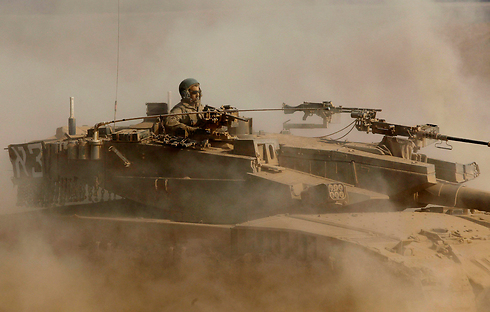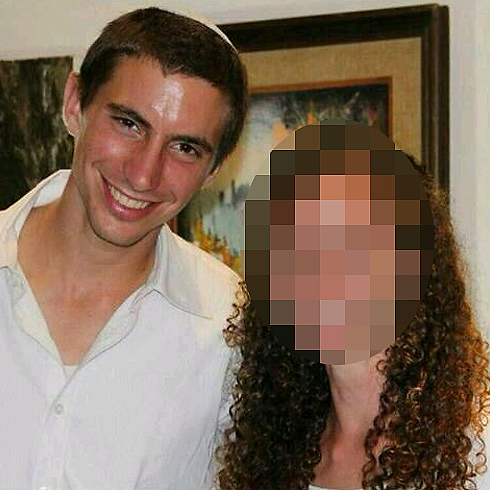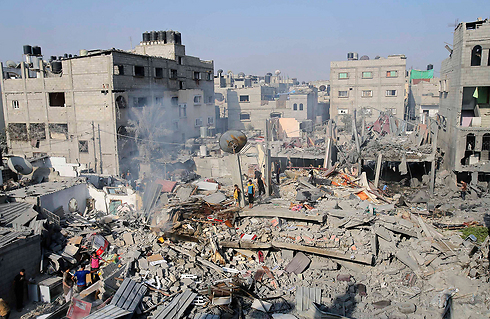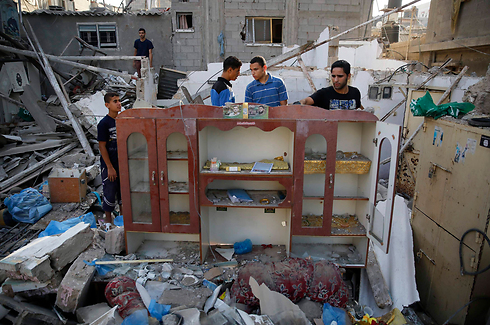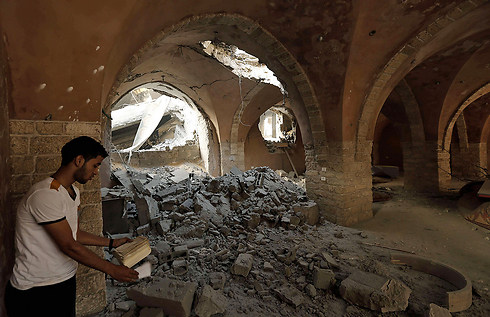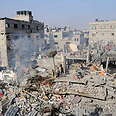
Soldiers wounded as IDF continue search for missing soldier
Forces hit Gaza hard with over 35 dead as search for soldier continues; senior IDF official: We're not sure captured soldier is even alive.
Two soldiers were wounded Saturday as IDF forces continued to comb southern Gaza for 2nd. Lt. Hadar Goldin who was captured in Gaza Friday morning. One of the soldiers was lightly wounded by a mortar and another suffered moderate wounds by snipper fire in Gaza.
Meanwhile, a senior IDF official spoke with Ynet and detailed the army's efforts to find the missing 23-year-old officer, which are focused on the Rafah area near Gaza's border with Egypt, as well as commenting on the IDF's ongoing mission to dismantle Hamas system of tunnels. According to the official, the IDF is still not sure if Goldin is alive or not.
Trying to explain the incident in which Goldin was captured and two other soldiers were killed, the senior IDF commander stresses the forces were crowded close together when a suicide bomber attacked them.
The senior IDF official admitted that in light of the attack's nature, the IDF "still do not have a working assumption of whether he was dead or not.
"We are trying to figure out and recreate exactly what happened. We still do not have full details regarding the suicide bomber, but we do know the forces died as a result for fire and the blast."
He explained that four or five soldiers were present at the scene and were "searching a tunnel area which Military Intelligence located.
"Some 1,500-2,000 meters from our territory they came across an open area near some homes, and then they ran into a terror cell which came out of a tunnel shaft into which the officer (Goldin) was taken."
Hamas' military wing said it believes Goldin might have been killed in the clash with Hamas' fighters. "We believe all members of this group have died in an (Israeli) strike, including the Zionist soldier the enemy says disappeared," it said.
Israeli officials have refused to comment on this claim.
Ongoing fighting efforts
Regarding the IDF's focus on southern Gaza, where the Goldin was captured, the official said that "In Rafah there is a large area in which our efforts are concentrated."
The senior IDF official also said that "In the last day, IDF forces have destroyed four tunnels and we are close to completing our treatment of them. The damage we have caused to them is formidable."
Regarding the IDF's overall operation in Gaza, the official said that the IDF is still hitting Hamas positions throughout the Strip.
"In the last day we have hit over 200 targets, the majority of which are military and command centers."
According to him the IDF has been met with little resistance in the field. "Besides the Givati incident (in which Goldin was captured and two soldiers were killed) we have had very few altercations. In one more case an anti-tank missile was fired at our forces in Saja'iyya."
Among the targets that were hit were arms warehouses and munitions centers, terror command centers located in the homes of terror operatives, including the home of Halil Bahtinu, head of the Palestinian Islamic Jihad's interior security, and a member of the group's military council.
The house of Khaled Manaama, who is in charge of Hamas' forces in Sheikh Radwan was also hit.
IAF forces also hit the rocket launcher which attacked Tel Aviv and central Israel Saturday morning.
According to him, the IDF has killed some 700-800 terrorists in the operation and morale among soldiers is high.
"Forces are free to act and move in the field, if they have chance to attack a terror target then they take it."
Overnight the IDF hit five mosques it claims were serving as command centers, "the next day will focus on destroying tunnels."
At least 35 Palestinians were killed in the bombardment and shelling in and around the city of Rafah early Saturday, said Palestinian health official Ashraf al-Kidra, adding that the area's main hospital was evacuated because of the strikes, which killed dozens of people on Friday.
Elsewhere in Gaza, Palestinian officials reported more than 150 airstrikes including one against the Hamas-linked Islamic University in Gaza City. Heavy shelling continued along the border areas.
The fiercest battles took place near the site of Friday's attack and purported abduction, near Rafah, about 3 kilometers inside the strip and close to the borders with Israel and Egypt. Officials have reported that dozens of houses have been damaged or destroyed in airstrikes.
Roi Kais and the Associated Press contributed to this report










